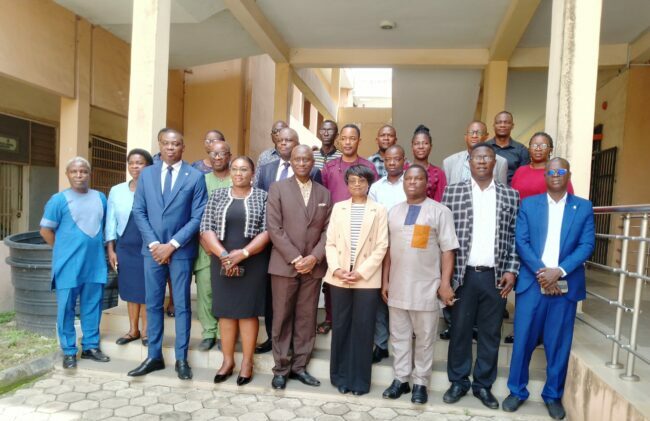Professor Winifred Ijomah, the Director of the Scottish Institute for Remanufacturing and lecturer with the University of Strathclyde, Glasgow, has stated that it is important for developing countries like Nigeria to invest in medical equipment remanufacture, given its potential to save foreign exchange, create jobs and enable affordable healthcare.
Professor Ijomah stated this during the second medical equipment remanufacture and reverse logistics workshop, held at the University of Ibadan (UI), on Monday.
The theme for the two-day workshop is ‘Developing Strategies for Sustainable Business Model and Reverse Logistics Network to Support Medical Equipment Remanufacture in Nigeria.’
The medical equipment remanufacture project, which is a collaboration with UI and the University of Strathclyde, is funded by the Royal Society, London. It aims to develop a key strategy for enabling affordable, sustainable healthcare in developing countries by establishing a medical equipment remanufacturing centre in Nigeria for the West African sub-region.
While explaining the current scenario, Professor Ijomah said 80 per cent of the global medical equipment supply is used in developed countries, comprising 20 per cent of the world’s population. She said the current solution being adopted is the donation of second-hand equipment and design for developing nations. With 70 per cent of this equipment being unusable, according to the World Health Organisation (WHO), its design is changed for developing nations, leading to reduced functionality.
She said the remanufacture project proposes to design products that can be manufactured, maintained and remanufactured in Nigeria, using resources and expertise within Nigeria.
Professor Ijomah said, “Remanufacture is a triple-win process; it is a win for the producers because it enables them to get huge profits; it is a win for the customer because he can get high-quality products at hugely reduced prices; and it is a win for the environment because it reduces the amount of environmental damage.
“For developing countries, it is actually going to reduce the amount of money that we spend in purchasing new products. If you want to purchase new products, you need foreign exchange, and we are short of that. Secondly, we want to use it to create our own indigenous workforce so that we can start our own manufacturing. It will enable us to create jobs for medium-, low-, and even high-skilled workers.
“It will also help us clean our environment because all these used products lying around Nigeria we can use in the remanufacturing industry and at the same time create employment and we have issues with unemployment in Nigeria.
“One of the most important things is knowledge transfer because we see the products at the end of life. In remanufacturing, we assemble them and study the components; therefore, we know the specifications for manufacturing and then we can manufacture but not manufacture, taking into account our own precise needs and the resources and skills we have in Nigeria.”
She stated that it was important for African countries to embrace medical equipment remanufacture given its benefits to the continent, stressing that “all major economies have identified remanufacturing as an enabler for future competitiveness. So, if we don’t cling quickly, they are going to do it a lot better before us and at the stage where we are now, we are lagging, but we can still try and start something. There is really a global race to build up capability and capacity for remanufacturing, like skilled workforce, improved supply chain and legislative framework.”
Speaking with the Nigerian Tribune, the Principal Investigator of the project and a professor of civil and biomedical engineering at UI, Professor Akinwale Coker, said the project aims to provide affordable and locally produced medical equipment and bridge the gender and town gap in medical engineering.
Prof. Coker said, “It is seen that remanufacture is relatively new in developing countries; it is well developed in the West, in Asia, in North America, in Europe but not in Africa. So, we are looking at a particular project that will have major relevance, which is what funders always look for.
“The funders have seen the need to contribute to the health sector of Nigeria with a project called remanufacture, and that is to say that we have the problem of materials that are imported, used in hospitals for a couple of months or a maximum of two years, and then dumped.
“So, we are looking at coming up with our own locally-produced materials and when we do that, it enhances sustainability; it helps us to be able to do something that we can use locally and if it has problems, like most mechanical equipment will have, the local technology is available, and the expertise is there to be able to manage and maintain them. Our bane in Nigeria is maintenance but if we have the technology and our technologists are in the know, they have the hands-on knowledge, they have the skills, and when it is damaged or there is a need for maintenance, they can step in.
“The university is coming in so that our engineers being trained in the university will not just have theoretical knowledge and are unemployable; they will be engineers that will have the hands-on skill. The fact that you are an engineer doesn’t stop you from putting food on the table. The era of theory is gone. People are looking for people who can contribute and who can make a difference in our society. We are integrating remanufacture into our curriculum, and the students are picking it up very early so that when the centre is set up, we have a crop of competent engineers who can manage it for sustainability.”
In his presentation and review of the business model for the proposed medical remanufacturing centre, Dr. Chibueze Achi, a member of the team, said the centre would collect used medical equipment from the University College Hospital (UCH), Ibadan, remanufacture medical equipment like incubators, phototherapy lamps, and anaesthetic machines, and also offer maintenance and repair services to generate additional funds.
Others are to sell or lease the equipment back to healthcare providers at a lower cost than new equipment while still generating revenue and profits; and explore working with a Nigerian transport company to offer reverse logistics services, including the collection, transportation, and disposal of used equipment, to help healthcare providers manage their waste and reduce their environmental impact.
Also, READ THESE TOP STORIES FROM NIGERIAN TRIBUNE
WATCH TOP VIDEOS FROM NIGERIAN TRIBUNE TV
- Let’s Talk About SELF-AWARENESS
- Is Your Confidence Mistaken for Pride? Let’s talk about it
- Is Etiquette About Perfection…Or Just Not Being Rude?
- Top Psychologist Reveal 3 Signs You’re Struggling With Imposter Syndrome
- Do You Pick Up Work-Related Calls at Midnight or Never? Let’s Talk About Boundaries







